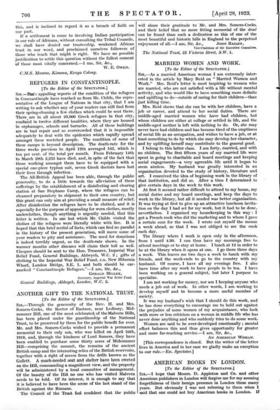MARRIED WOMEN AND WORK.
[To the Editor of the SvEcrieron.1 SIR,—As a married American woman I am extremely inter- ested in the article by Mary Reid on " Married Women and Work." Mrs. Reid's letter is most inspiring to women who are married, who are not satisfied with a life without mental activity, and who would like to have something more definite and uplifting to do—outside of caring for their children—than just killing time.
Mrs. Reid shows that she can be with her children, have a job or career, and attend to her social duties. There are middle-aged married women who have had children, but whose children are either at college or settled in life, and the middle-aged mother is left with nothing to do. Or, she may never have had children and has become tired of the emptiness of social life as an occupation, and wishes to have a job, or at least something to do by which she may develop her character, and by uplifting herself may contribute to the general good.
I belong to this latter class. I am forty, married, and with no children. The first fifteen years of my married life were spent in going to charitable and board meetings and keeping social engagements—a very agreeable life until it began to seem aimless. My husband was greatly interested in an organization devoted to the study of history, literature and art. I conceived the idea of beginning work in the library of that institution, and did so. After a time I determined to give certain days in the week to this work.
At first it seemed rather difficult to attend to my house, my social duties and my board meetings, and keep the days to work in the library, but all it needed was better organization, It was trying at first to give up an attractive luncheon invita- tion on the day I had set for my work, but it had to be done, nevertheless. I organized my housekeeping in this way : I got a French cook who did the marketing and to whom I gave a certain sum for the week. I wrote out myself the menus a week ahead, so that I was not obliged to see the cook each day.
The library where I work is open only in the afternoon, from 1 until 4.80. I can thus have my mornings free to attend meetings or to stay at home. I lunch at 12 in order to be at the library when it opens at one. I go there three days a week. This leaves me two days a week to lunch with my friends, and the week-ends to go to the country with my husband. Of course, I have all my evenings free. I also have time after my work to have people in to tea. I have been working on a general subject, but later I purpose to specialize.
I am not working for money, nor am I keeping anyone who needs a job out of work. In other words, I am working to develop myself and to become a more useful member of society.
It was my husband's wish that I should do this work, and he has done everything to encourage me to hold out against the prejudice of some women of my acquaintance, who look with more or less criticism on a woman in middle life who has never done anything and who suddenly tries to do some work.
Women are said to be over-developed emotionally ; mental effort balances this and thus gives opportunity for greater and more far-reaching service.—I am, Sir, &c., AN AMERICAN Womarr.
[This correspondence is closed. But the writer of the letter lives in America and in her case we gladly make an exception to our rule.—En. Spectator.]


















































 Previous page
Previous page